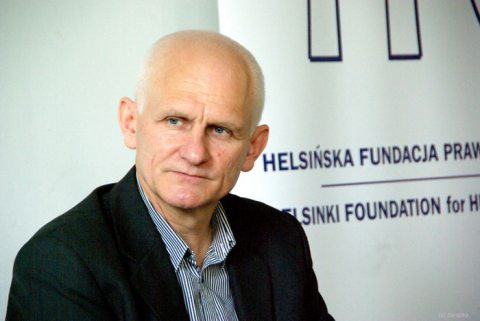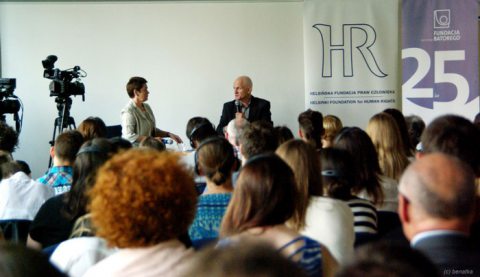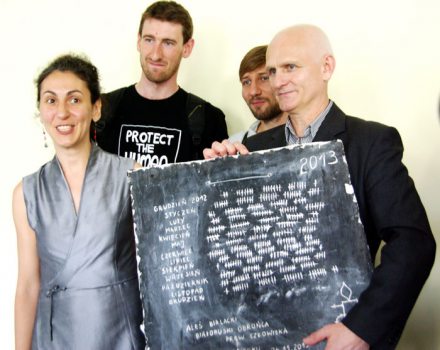Ales Bialiatski's first visit to Poland after release from jail
"For the three years I spent in prison, I was struck by the fact that many non-political, cultural, linguistic and social initiatives appeared in Belarus. This proves that our civil society develops," stated Mr. Bialiatski at a meeting in Warsaw. His visit to the Polish capital completes the tour of the Belarusian human rights activist across European countries.
Chairman of the Human Rights Center "Viasna" came to Warsau on invitation of the Helsinki Foundation for Human Rights and Stefan Batory Foundation. The visit began on Wednesday, July 9, with a closed-door meeting with representatives of the Helsinki Foundation for Human Rights, at which the human rights sector discussed the situation in Belarus. "It was a friendly meeting with representatives of the human rights organization. It was attended by representatives of the Foundation and program experts. In addition to human rights issues, the meeting addressed the issue of the situation in Belarus in the context of Ukraine and Russia. Ales also told us about his life in prison,"- said Olga Salamatova of the Helsinki Foundation. Belarusian human rights activist received a souvenir photo in which employees of the Foundation are holding posters that were created as part of an the action in his support. (The posters in the photo were drawn by representatives of various organizations from around the Soviet Union during the OSCE summit in Warsaw three years ago). 

The situation in Belarus and the Belarusian economic dependence on the Russian influence, as well as the Ukrainian crisis - these issues were also discussed during the open meeting of Ales Bialiatski with representatives of NGOs and journalists at Stefan Batory Foundation on Thursday. The meeting was led by the Polish journalist Maryja Przeshelomiec, author of the analytical program "Studio Wschód" on the Polish public television, devoted to the countries of the former USSR.
Much attention was paid to the influence of the crisis in Ukraine on the Belarusian society and the possible repetition of the scenario of the European Maidan in Belarus. "Nobody wants a war in Belarus, I also support it. I'm not ready to change the situation by means of war. You can look at the situation in the Arab countries. Change is necessary, and it is difficult to predict how far the situation in Ukraine can go. If the situation improves, it will be a good example of a signal to the Belarusian society. It is very important what will happen in the Ukraine in the next 5-7 years,” says Ales Bialiatski. Speaking about the reasons for the total economic Belarus' dependence on cheap Russian energy, Bialiatski noted that reassessment of the value of Russia will take part both in the West and in Belarus.
As for the results of his tour around European capitals, the human rights activist said: "Right now, there are processes that decide what position our country will take in the future, whether we will be a gray zone like Abkhazia or Trans-Dniester region, or normal European country. It is important that the EU does not lose sight of Belarus. It is important that Belarus is not isolated. Particularly important for us is cooperation with Poland and Lithuania, as we are in the same region. My trip to Europe is connected to resolving the issue of political prisoners in Belarus,” said Ales Bialiatski.
Being asked what has changed in three years in Belarus, Mr. Bialiatski said he was struck with the development of the civil society and the great number of non-political initiatives. Moreover, he noted the importance of the development of the Internet, which gives access to information.
Representatives of human rights organizations asked how civil society had changed in Belarus in recent years, what kind of help is needed by Belarusian NGOs from Western organizations.
"Regardless of where the organization is located, it can help Belarus if it really works and implements its projects", said Ales Bialiatski. He stressed that the civil society in Belarus is developing: "I judge by my own experience, twenty years ago, I knew personally all the representatives of non-governmental organizations, then only a half, and now I know only 5%. This proves that the process is going on. There are many cultural initiatives launched by young people even out of big cities." With regard to projects that can be implemented in Belarus, Bialiatski said: "It is more efficient to organize a concert in the Belarusian language, as it helps to unite the people".
To the question of why Lukashenka (who celebrated 20 years of his reign on Thursday) held a speech in Belarusian, Bialiatski said: "Let's see if it is a trend or a temporary phenomenon. For the authorities, the language is not strategic, but a tactical problem. Our society must ensure the rights guaranteed by the Constitution, i.e. a greater presence of the Belarusian language."
The atmosphere full of hall was eased by questions about Ales' rest and the meeting with nuncio in jail. This was the only meeting apart from meetings with wife during the whole term of imprisonment. Ales and nuncio talked in the presence of an officer of the penal colony about ... Belarusian and Italian literature. 
In the afternoon Ales Bialiatski had a meeting with the head of the Office of the President of the Republic of Poland, Jacek Michalowski. The human rights activist was accompanied by Chairperson of HFHR Danuta Przyvara and deputy chairman of the HRC "Viasna" Valiantsin Stefanovich.
"The meeting was held in a friendly atmosphere. At the very beginning of the conversation, the were presented apologies on behalf of the President for the fact that one of the grounds for the sentence Bialiatski were actions of the Polish side. We talked about the general situation in Belarus, Ukraine, about how Russian media impact on public consciousness of the Belarusians. We also talked about cooperation between Belarusian NGOs and Polish organizations," said Valiantsin Stefanovich.
The importance of the information space in Belarus was also discussed at the meeting in Polish Sejm with members of the parliamentary commission on foreign affairs, headed by its chairman Grzegorz Schetyna.
Ales Bialiatski repeated to Polish MPs the things he said earlier in the Office of the President of Poland, that information that comes also from the Polish media in Belarusian, such as the TV channel "Belsat", European Radio for Belarus and "Belarusian Radio “Racyja" is very important for Belarusian citizens.
After meeting with the MPs, Ales Bialiatski and Polish deputy Robert Tyszkiewicz, who is responsible for cooperation between Poland and Belarus in the parliamentary commission, held speeches at a briefing for Polish journalists working in Parliament.
On Thursday morning, during a short live interview to a private television station Polsat News, Ales Bialiatski shared his impressions about how he felt in Poland, in the country, through the fault of whose officials he got imprisoned. "Still, I was imprisoned by the Belarusian authorities, and they can use any methods for their own purposes," said Bialiatski and noted that he thinks of Poland "as a country which has passed the positive changes in the last 25 years and has become a heaven for a society that seeks development." Ales Bialiatski's visit to Poland will end on Saturday.
Informational office for solidarity with Belarus “Belarus in Focus”





















